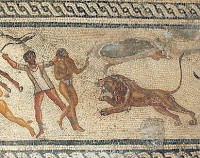Tacitus on the war between Oea and Lepcis
War between Oea and Lepcis

In 68, the Roman government collapsed. Nero was unfit to rule, and Gaius Julius Vindex in Gaul, Servius Sulpicius Galba in Spain, and Lucius Clodius Macer in Africa revolted. Of these, Galba was victorious and became emperor. However, when he was challenged by Aulus Vitellius, he made mistakes, which led to his being lynched.
Meanwhile, Macer had been assassinated and had as governor of Africa been replaced by Valerius Festus. He was related to Vitellius, who had to defend himself against a new contender, Titus Flavius Vespasianus. The inhabitants of Oea (modern Tripoli), believing that governor Festus could not intervene, decided to attack their archenemies, the people of Lepcis Magna. The story is told by Tacitus; chapter 4.50 of the Histories is offered here in the translation by Kenneth Wellesley.
Later on Festus settled a dispute between Oea and Lepcis. Its origin had been petty - the stealing of crops and herds by the peasants of the two states. But by this time it involved full-scale hostilities and set battles. The reason was that the men of Oea, being outnumbered, had called out the Garamantes, a wild tribe much given to plundering its neighbors. Thus the people of Lepcis had been reduced to sore straits. Their lands had been extensively ravaged, and they were now cowering behind the walls of their capital. But the intervention of the Roman auxiliary horse and foot resulted in the utter defeat of the Garamantes and the recovery of all the loot, apart from that which the nomads had sold to the people of the interior as they wandered from one inaccessible encampment to another.
Later, Festus attacked the Garamantes at home, and the Lepcitanians got hold of some of the raiders. They were executed in the arena of their amphitheater, an incident shown on a mosaic in the Villa of of Villa Dar Buc Ammera, where we can see how men with a dark skin are offered to the wild beasts.